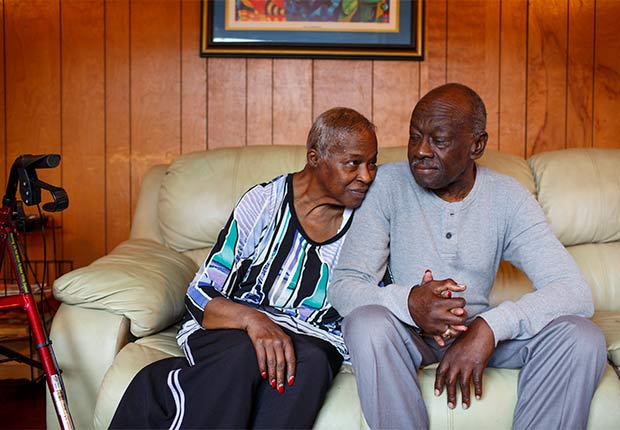AARP Hearing Center

By Drew Jubera
Among the many tasks Willis Collins has done while caring for his ailing wife, Lillie, 69, the scariest may have been determining what to give her when her blood sugar was too high or too low. Both are potentially dangerous for a diabetic.
It frightened Collins because, he said, he hardly had a clue. No one had told him how to calculate his wife’s insulin dosage. “I was shooting in the dark,” said Collins, 72, a retired salesman and science teacher from East Point. “I figured there had to be a formula.”
There was. When his wife went into rehab for another condition in October, Collins noticed that a nurse checked her blood sugar levels and then used a calculator to figure out the proper dosage. The nurse showed him how she did it. It wasn’t complicated.
“And from that day on, I used that formula, and it’s worked beautifully,” Collins said. “We could’ve used it years ago.”
To help caregivers like Collins, AARP Georgia plans to push for the Caregiver Advise, Record, Enable (CARE) Act in this year’s legislative session, which begins Jan. 11.
The bill would require hospitals to provide family caregivers with an explanation and live instruction for such medical tasks as giving injections, managing medications and caring for wounds.
Hospitals would also have to record the name of a family caregiver when a patient is admitted and notify the caregiver before the patient is discharged.
Supporters say the CARE Act, adopted in 18 states, could help reduce hospital readmissions.
It could have far-reaching effects in Georgia. There are about 1.3 million family caregivers in the state at any time, who provide more than $14 billion annually in unreimbursed care, according to an AARP Public Policy Institute report.
“People are living longer and wanting to stay in their homes, and a lot of times the only way they can is by relying on loved ones,” said Melissa Sinden, associate state director of advocacy for AARP Georgia. “That’s why the CARE Act is important. It’s a recognition that sometimes the role of the caregiver evolves.”
More demanding tasks
A national study conducted by the Public Policy Institute and the United Hospital Fund, a nonprofit research organization, underscored just how evolved that care has become.
Almost half of the respondents performed medical or nursing tasks for people with multiple physical and cognitive conditions. Three out of 4 of these were managing medications, including intravenous fluids and injections. More than a third were caring for wounds.
Nearly half of those managing medications said they had never received any training.
“It’s a huge problem,” said study coauthor Susan Reinhard, an AARP senior vice president and director of the Public Policy Institute. “It’s a common experience for caregivers to be asked to do things that would make a nursing student tremble.”
The Georgia Hospital Association is waiting to take a position on the CARE Act until it has seen the wording of the bill, said GHA spokesman Kevin Bloye.
Many doctors and nurses believe they already give appropriate instruction. But they often don’t appreciate a caregiver’s anxiety level and lack of medical knowledge.
“Sometimes providers don’t realize that the family member is paralyzed by fear, and they use medical language the caregiver might not understand,” said Carol Levine of the United Hospital Fund and the study’s coauthor. “There’s a disconnect between what the professionals believe they do and what’s being heard.
“Under the CARE Act, they would have to make sure the information and instruction is understood and people can go home and act on it,” Levine said.
Collins said the bill would have a big impact on caregivers like him: “It would be a great help just knowing what to do. I’d feel more comfortable, and my wife would feel more comfortable, too.”
This session, AARP will also support a bill, passed in 42 states, to recognize adult guardianship orders from other states, and the Family Care Act, which would allow employees to use up to five of their sick days for caregiving purposes.
Drew Jubera is a writer living in Atlanta.































































